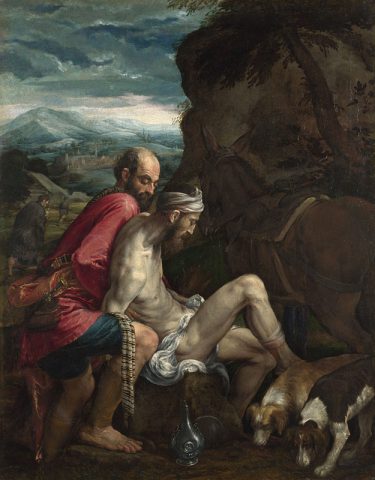By Fr. Jerry Pokorsky, Catholic Culture, July 14, 2025
Fr. Jerry Pokorsky is a priest of the Diocese of Arlington who has also served as a financial administrator in the Diocese of Lincoln. Trained in business and accounting, he also holds a Master of Divinity and a Master’s in moral theology. Father Pokorsky co-founded both CREDO and Adoremus, two organizations deeply engaged in authentic liturgical renewal. He writes regularly for a number of Catholic websites and magazines. See full bio.
 The Parable of the Good Samaritan reinforces the truth that charity is personal, not bureaucratic. The Church includes all the baptized. “Now you are the body of Christ and individually members of it.” (1 Cor. 12:27) The Catholic Church is universal. Many tribes and nationalities make up the Church. Like the relationship between Jesus and His disciples, the relationship between the clergy and the laity is personal. The clergy are priests, prophets, and kings. They celebrate the sacraments, proclaim the Gospel, and rule the Church—especially parishes, dioceses, and religious orders. The Pope is also the secular ruler of the Vatican by necessity. But the Church does not permit the clergy to become politicians. (Some may remember the anomalies in Congress and during the Liberation Theology crisis many years ago. Pope John Paul II brought a painful but necessary resolution to the confusion.)
The Parable of the Good Samaritan reinforces the truth that charity is personal, not bureaucratic. The Church includes all the baptized. “Now you are the body of Christ and individually members of it.” (1 Cor. 12:27) The Catholic Church is universal. Many tribes and nationalities make up the Church. Like the relationship between Jesus and His disciples, the relationship between the clergy and the laity is personal. The clergy are priests, prophets, and kings. They celebrate the sacraments, proclaim the Gospel, and rule the Church—especially parishes, dioceses, and religious orders. The Pope is also the secular ruler of the Vatican by necessity. But the Church does not permit the clergy to become politicians. (Some may remember the anomalies in Congress and during the Liberation Theology crisis many years ago. Pope John Paul II brought a painful but necessary resolution to the confusion.)
The laity are also priests, prophets, and kings by Baptism and according to their baptismal promises. They sanctify their lives by their encounter with Jesus in the sacraments. They proclaim the Gospel with their lives. They rule their personal lives, their families, communities, and nations. The lay sphere of life necessarily intersects with the religious sphere. In the Vatican II Decree on the Apostolate of the Laity, the Council Fathers defined the rights and duties of the laity (as does Canon Law) according to our respective states of life. …
Continue reading >>>>>>>>>>>>>





 The Parable of the Good Samaritan reinforces the truth that charity is personal, not bureaucratic. The Church includes all the baptized. “Now you are the body of Christ and individually members of it.” (1 Cor. 12:27) The Catholic Church is universal. Many tribes and nationalities make up the Church. Like the relationship between Jesus and His disciples, the relationship between the clergy and the laity is personal. The clergy are priests, prophets, and kings. They celebrate the sacraments, proclaim the Gospel, and rule the Church—especially parishes, dioceses, and religious orders. The Pope is also the secular ruler of the Vatican by necessity. But the Church does not permit the clergy to become politicians. (Some may remember the anomalies in Congress and during the Liberation Theology crisis many years ago. Pope John Paul II brought a painful but necessary resolution to the confusion.)
The Parable of the Good Samaritan reinforces the truth that charity is personal, not bureaucratic. The Church includes all the baptized. “Now you are the body of Christ and individually members of it.” (1 Cor. 12:27) The Catholic Church is universal. Many tribes and nationalities make up the Church. Like the relationship between Jesus and His disciples, the relationship between the clergy and the laity is personal. The clergy are priests, prophets, and kings. They celebrate the sacraments, proclaim the Gospel, and rule the Church—especially parishes, dioceses, and religious orders. The Pope is also the secular ruler of the Vatican by necessity. But the Church does not permit the clergy to become politicians. (Some may remember the anomalies in Congress and during the Liberation Theology crisis many years ago. Pope John Paul II brought a painful but necessary resolution to the confusion.)

